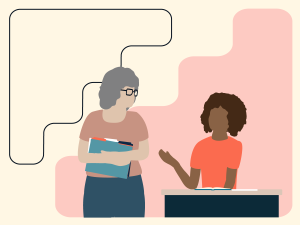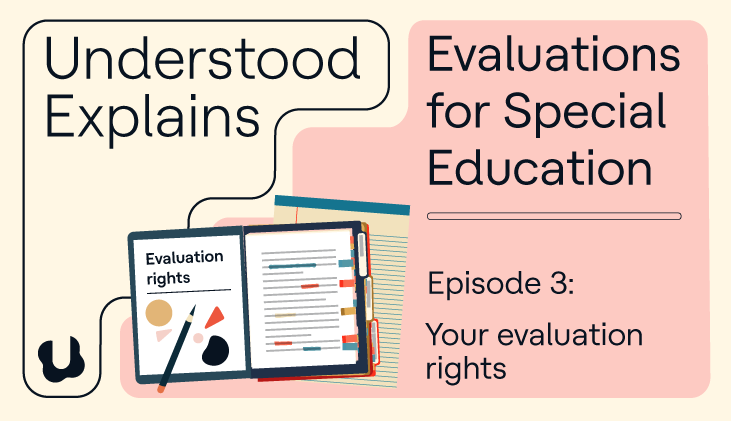Stay in the know
All our latest podcasts delivered right to your inbox.
What rights do families have in a school evaluation? This episode of Understood Explains highlights five key ways that special education law protects your rights during the evaluation process.
Host Dr. Andy Kahn is a psychologist who has spent nearly 20 years evaluating kids for public and private schools. Andy’s first guest on this episode is lawyer Andrew M.I. Lee. They’ll cover a few key areas:
What your rights are during the evaluation process
Why it helps to be polite and assertive when partnering with your child’s school
What to do if you think the school isn’t following the rules
Andy’s second guest is parenting expert Amanda Morin. She’ll give tips on what to avoid saying to your child about any disputes with the school.
Related resources
Downloadable letter templates and talking points
Episode transcript
Lisa: Hi! My name is Lisa, and my son had his first public school evaluation in the sixth grade. And looking back, I wish, for one, that I had known that I had rights to push the school and demand that he be tested, despite the fact that you shouldn't have to be demanding and you shouldn't have to be aggressive with the school to get what you need. But I wish that I had known that I had the right to do that.
Andy: From the Understood Podcast Network, this is "Understood Explains." You're listening to Season 1, where we explain evaluations for special education. Over 10 episodes, we cover the ins and outs of the process that school districts use to evaluate children for special education services. My name is Andy Kahn, and I'm a licensed psychologist and an in-house expert at Understood.org. I've spent nearly 20 years evaluating kids for both public and private schools. I'll be your host.
Today's episode focuses on your legal rights. We're going to cover three key things: what your rights are during the evaluation process, how to advocate if you think the school isn't following the rules, and what to say or not to say to your child about any disputes with the school. But first, let's hear from another parent.
Jennifer: I'm Jennifer, from Atlanta. My son Nathan is 11, and he has dyslexia, dysgraphia, and ADHD. So when we requested the evaluation, I knew at that time that I could request to have the evaluation report up to five days prior. So I did have that, thankfully. I knew to ask for that. I did not know at the time that I could ask for a draft of the eligibility report beforehand, and it was a game-changer.
Andy: The evaluation process can feel very complicated and overwhelming to students and their families. But there are a lot of rights that protect families along the way. For starters, the school can't evaluate your child unless you give them permission. And if you disagree with the evaluation results, you have the right to ask for an independent evaluator to do another evaluation at public expense, which means at no cost to you. To help me explain these and other evaluation rights, I want to bring in my first guest today. Andrew Lee is an editor here at Understood. He's also a lawyer with expertise in disability law, including federal and state special education laws. Andrew also is a key player in Understood's Podcast Network, including helping launch this first season of "Understood Explains." Andrew, welcome to the show.
Andrew: Thanks for having me. Super excited to be here.
Andy: So Andrew, let's start off talking about the hugely important federal law that families need to know about. Give us a quick overview on IDEA.
Andrew: Yeah, IDEA is the Individuals with Disabilities Education Act. That's quite a mouthful. But IDEA is our nation's special education law. So this is the law that grants to students with disabilities one of their most important rights, and that's the right to a free appropriate public education. That includes basically all the supports and services that a student might need to make progress in school. Along with that special education, we have to determine who's entitled to those rights. And that covers evaluations, which you're going to ask me about here. But that's why the IDEA is such an important law for any child who has a disability, including a learning or thinking difference in school.
Andy: In talking about evaluation rights, you know, one of the things that's awesome is that, Andrew, you wrote a really great article for Understood called "Evaluation Rights: What You Need to Know." And folks, you can access that in our show notes. Now, that article includes 11 evaluation rights — specific rights. And you know, we're not going to cover them all here today, but I was hoping maybe you could pick your top five, and maybe talk about the top five most important rights we want to share with our audience here today.
Andrew: Yeah, if I had to pick the five evaluation rights that I think are most impactful, I'd start off with right number one: the right to just ask for an evaluation. I think that parents a lot of times think that they have to wait for a school to start this process off. But that's not correct. You have the right to ask for an evaluation at any time.
Right number two of my top five evaluation rights would be the right to a comprehensive multidisciplinary evaluation. That's a lot of words, but basically it means that an evaluation can't just use one test or measure to determine if your child qualifies for special education. It has to involve a variety of tests and data. And its goal is to really get a full picture of what's going on.
Right number three is the right to be involved. Again, we think of schools as sort of always having to come to us as parents before anything happens. But within the context of special education and evaluations, you have the right as a parent to attend meetings, see evaluation reports. You have the right to have things explained to you, to just be part of the process. And that's so important.
Right number four, I would say, is the right to a prompt evaluation. And that means an evaluation that doesn't just go on forever. In federal law, the IDEA, which we mentioned, the timeline is 60 calendar days. Now, states have their own specific rules that sometimes change the number of days or account for vacations, etc., but the most important thing is that there is a date. And that you know that this has to end, and it can't go on just with a limitless amount of time.
And right number five, I would say, that's among the top five evaluation rights, is the right to disagree and challenge the evaluation process itself. Even when you're being involved in the evaluation and the meetings, you have the right to say, "Hey, you know what? I don't think this is the best way to do things." Or, "I think we should be testing not just for reading but also for focus. I think we should be looking at this." That's just a really important right to know about. There are some formal processes that are involved in that, like an independent educational evaluation, where you can ask someone outside of the school to do an evaluation at the school's expense. Or due process, which is a more involved — it's kind of like a mini trial between you and the school if you really get into kind of loggerheads about what should happen. So those are my top five evaluation rights. There are many more, but I think those are the ones you want to remember.
Andy: Perfect. So let me circle back here for a second. You used the term when we talked about the comprehensive multidisciplinary evaluation. And I think you talked about "comprehensive" in terms of, you know, a variety of different kinds of tests, or we use the words "tests" or "measures," all talking about the specific activities the child would be doing to be evaluated.
When we talk about "multidisciplinary," I think it's important for parents to know that might mean someone's doing an academic evaluation, where we look at their specific skills. Or psychological, where we're looking at mental health and behavioral questions. Or speech and language, or occupational therapy. Each of those are considered a discipline, so to speak. The idea is to get the best image of how your child is doing across the most useful areas for them in school. So, Andrew, as we think about steps and learning about their rights, what can families do if they think the school district isn't following the rules? Any suggestions about how you can point it out or how you can even start that conversation?
Andrew: There are rules that schools sometimes don't follow, though I think schools always try to do their best, and teams do their best. And what I've seen is there are a number of ways that parents react, and two ways that I want to highlight that aren't so helpful are really important to know. The first one is when parents kind of go with the flow because they don't like conflict. What I'll see sometimes is that a parent will just be a part of the evaluation process. They'll — they may think to themselves, you know, "This doesn't seem right, but, uh, I'm just gonna, they seem like they know what they're doing. You know, this, I'm not really comfortable with this, but I don't want to raise it, I don't want to make waves."
And I think the issue there for that type of reaction is that that's not the best way to advocate for your child. And that doesn't help the team either. That doesn't help the evaluation process you're — you need to, if you think there's something wrong, or if you think you know something important about your child or about what's happening, you are the expert and so you shouldn't just go with the flow. You should raise your voice and say, "Hey, you know, I don't think this is right." And, and that's really important.
Andy: I want to circle back on the "going with the flow" side of it, Andrew, because I think that, you know, the phrase that one of the parents said to me once is, "When I sit at that table, sometimes I just go along to get along." And I think it's sort of — the word I'm going to use is sort of being passive, letting the process come to you and not really having an active role. And I think that for families — listen, we would love for this to be something that just went exactly as we hoped and didn't really have to stress the parents. But the reality is, these parts of the process can be complicated. And sometimes, being an active, involved party is going to get you much, much, or I would say, it's always going to get you a better outcome if you're an active participant.
Andrew: The other way I would say that I see parents sometimes react that's not helpful is they get angry and emotional. And I understand that, too, because these are our kids, we really care about them, and, you know, it's easy to get angry or just emotional when things are happening that we don't like. And sometimes what happens in the evaluation process and special education in general is that things kind of spiral a little bit and it kind of breaks down the partnership that you have with the school. And that's not a good thing, either.
So I just want to caution about those two types of reactions, either going with the flow totally or getting overly emotional. And I would say that the best way that I've seen — and I'd love to hear your thoughts, too, Andy — is to have a combination of being both collaborative and assertive. So what I mean by that is try to work through with the team or the evaluation team and the school in a kind and pleasant manner, but never be shy about directly questioning something you think isn't right or isn't appropriate. You know, evaluation teams, they're professionals. They're used to all kinds of parents, including ones who are really angry and including ones that, you know, may be upset. And if you're kind and polite, you can be really direct without hurting the relationship. I know it's hard, but, try to take that emotion out of it.
Andy: When we think about the emotional side of this, I've never been in a meeting where, you know, a family who hasn't been able to say, "You know what, I'm having a really strong reaction, can we take two minutes, just take a break, you know? What you said really means a lot to me. And I feel like I'm — I need just a second to get my head on straight." And I think that everybody around the table is going to understand that. This is your child, and it's — that child is most important to you. So being able to have that reaction, have that emotion, but bring yourself back in line to say, "OK, now how are we going to move forward?" And I love the word, Andrew, to "collaborate." How are we going to work together? So I think those are great points, you know, trying to keep that emotion in check. And if it's there, just take a second. You know, everybody around the table is going to get it. There are a lot of parents around that table, even though they're not the parent of your child.
When you start this conversation with families, do you have any favorite sentence starters or ways to help them jump off on these conversations with their school, or even tips for letter writing?
Andrew: Yeah, there are actually, for example, for writing letters, there are tons of draft letters and emails out there with language; it's already prepackaged. There are also already sentence starters that we have on Understood, about how to say things. So that's really important to remember. If you come to a situation where you need to ask for something, see if it's already been done before, whether it's an evaluation or you're asking for a change to some of the evaluation process, see if it's been done before.
The second thing I would say is, as a tip, is when you're doing your — when you're speaking with the school, maybe there's not a template for what you want to say. It's always really good to start out with a statement of fact that you know, or one of your rights, and then ask a question, because that's a very easy way to tee things up and to give the school or whoever you're interacting with the ability to say, "Hey, you know, maybe I'm wrong." Or maybe, or, "That does make sense. Why are we taking, why is this happening?"
So, here — let me give you two examples. So let's say, uh, you know, the evaluation process has gone a really long time, and it's just been dragging on. And you want to know why. So you start off with your right and with just a factual statement: "I read that the evaluation must be completed within 60 days. Why is this process taking so long?" So what you're doing there is — it's what makes it helpful — is you're starting with something they can't really dispute. It's got to be completed in 60 days, and you're just asking something that the conclusion is pretty clear, it should be done.
Here's another example that I would perhaps use. Let's say that you're in the middle of the evaluation process, and you feel like it's not — they're not looking at everything that you think they should be looking at. Something you might say is, "You know, I've read in the papers that you gave me that the evaluation should be comprehensive. But we're only looking at one aspect of my child's struggles. Can you explain why that is?" Again, you're referring to something that they gave you, you're referring to something they should be able to agree on, and you're mentioning they’re only looking at one aspect of struggles, and you're asking them to explain that. So I think that's a really good way, if you don't know how to sort of bring up a disagreement or a concern, it's a really good, great way to start, is to start out with that statement or right and then just ask the question. And from there the conversation can develop.
Andy: So before we move on, one of the things I want to make a note of is that, folks, we have an array of downloadable templates for different kinds of letters that you'll find in the show notes. All right, so let's talk about one or two key moments in the evaluation process when it's really important for families to be thinking about their rights.
Andrew: Yeah, so the first key moment, I think, that's really important for families when thinking about their rights is in the drafting of the evaluation plan. There's going to be some back-and-forth between you and the school about what goes in the plan. But at some point, there is going to be an evaluation plan that you're presented with. And at that point, you have to decide whether or not that plan is something that you are happy with or not.
Now, many schools are going to communicate to you at some point what they can and can't do, the types of tests that are within their resources and the tests that are not within their resources. So this is really a place where you might want to think, is this plan — if you're unhappy with this plan, is this something you can live with? Is this something that will address the main challenges that you think that your child has? Or do you think the plan is not appropriate? And that's going to lead you to decide, "Well, OK, let's go ahead," or "No, I don't think that this plan is right for my child, and I'm going to object to that." Or "I'm going to object to this part of it."
And so you've got to keep in mind, you know, during this process that IDEA says that parents like yourselves are involved, but ultimately the evaluation process and special education is directed by the school, so the team might go ahead regardless of your objection. And I think if you do have an objection, if you do have some serious concerns, it's never a bad idea to put that in writing, to just send an email after, again, being collaborative but assertive, and saying something to the effect, you know, "We discussed adding this type of test, and I really think it's important to do so, and so I’m disagreeing with that part of the evaluation. I just want to let you all know. And I'm happy to continue working with the team to get my child the services they need. But this is something I disagree with."
Andy: So, Andrew, we're talking about what families can do if they disagree with the school, and you just described a key moment that can happen early in the evaluation process. But let's jump ahead for a minute and talk about what can happen later in the process. What are some of the common things — the common disagreements — families have with schools after they get the evaluation results?
Andrew: Yeah, there are basically two ways this can break down. The first one is that the evaluation might go through, the process happens with your child, and the evaluation results are perfect — to you, in your eyes, are appropriate in your eyes. Your child struggles with this and that; they need support. But then there's a disagreement with eligibility. And I think that later in the series, you'll get in to eligibility. But it's not that uncommon for schools and parents to disagree on whether or not, even though a child is somehow struggling or has some difficulties, for there to be a disagreement about whether or not the child qualifies or is eligible for special education services under IDEA. So, in that case, when you disagree with the eligibility determination, you can start off first just by asking for an explanation. And you have a right to it — that's part of your right to be involved. In fact, they should be able to provide you a written explanation.
In addition to that, you know, the other thing you have to think about at that point is like, if you disagree with eligibility, how are you going to, how are you going to challenge that? Will you challenge that? I mentioned before, you know, the right to due process, which is that mini trial. There's also the right to mediation, which is sort of when a third party comes in and works with you and the school to work out a solution. But that is a really serious point. It's an important point where you have to decide what happens next. A lot of people do look to either lawyers or advocates, special education advocates, to help them decide and help them understand if what the school is saying is true and if it's valid under the law.
The other disagreement could happen around the evaluation results themselves. So even though a plan might have been put into effect, it's definitely possible that the results themselves can be incomplete or flawed, or they don't have the right testing, in your view. And in that case, that might not have necessarily anything to do with eligibility, but it does have to do with what the results are. In that case, you have a couple options, you know, again, you can disagree, you can go to due process. But you also have another thing that I think is really important — another right, which I mentioned earlier, and that's an independent educational evaluation at public expense. And what this means is that you can actually ask the school to pay for an evaluator not associated with the school to actually redo the evaluation or do their evaluation.
As you might expect, a lot of schools don't agree with this, but they have to actually explain why in writing. And the law typically requires them to go through some procedural hoops, to jump through some due process hoops, to justify their evaluation. So it's a really powerful right, if you do disagree with, you know, how the evaluation has gone down.
Andy: Thanks so much. You know, that was a really helpful overview of the evaluation rights.
Andrew: Thanks so much for having me, Andy. I had a lot of fun, and I hope it's helpful for parents.
Andy: I also want to make clear to listeners that this isn't the last time we're going to be talking about legal rights in this season. In pretty much every episode, we'll talk about rights for that part of the evaluation journey. And we have lots more about your rights on Understood.org.
Haizel: Hi. My name is Haizel. I'm in the Bronx, New York. My daughter's name is Sayeira. She is 16 years old. She is currently a junior in high school. Sayeira has been evaluated or reevaluated by the school district several times, and I believe that at least twice was at my request. Even though she's expected to be reevaluated every three years, I did use my parental rights to have her evaluated sooner than that because I felt that her needs were not being met.
Andy: So we've been talking about families' legal rights during the evaluation process. But let's pivot now and talk about what parents can say to their kids about these things. It can be tricky. The territory can include all kinds of possible conflict, or parents feeling anxious or emotional and worried about the process. So to help suggest what to say and what not to say to kids, I'd like to bring in my next guest, Amanda Morin. She co-hosts Understood's "In It" podcast, about the joys and frustrations of parenting kids who learn and think differently. She's also a former teacher and the mom of two kids who learn differently. She's a parent advocate who has trained with a council of parent attorneys and advocates. My guest, Amanda Morin, welcome.
Amanda: Thank you.
Andy: Let's talk a little bit about some of those details. What are the pitfalls, the things to say, the things not to say?
Amanda: So, it's interesting that you asked me this, because we just had an IEP meeting for one of my own kids. And the IEP is that meeting that happens after the evaluation process for the Individualized Education Program that may come after the process. But the point is that one of the rights is to have your kid involved. And I think that sometimes we forget that bringing our kids into the conversation doesn't have to be about all of the emotion behind it and all of the angst and all of the things that we as parents worry about. It can just be about letting them know, you know, there's this giant booklet on our table that says "Rights and Safeguards and Policies." Because you're going to get that and you're going to have like 14 copies of it eventually, because they hand it to you every time you talk about this. And it's daunting. And I think when kids see that kind of thing, they're like, "Wait a minute, what is going on here?" And as parents, we're trying to figure that out. We're trying to figure out what it means. And to say to our kids, when this really boils down to it, it's what protects us in the process here, right? It gives us the outline of how we can figure this out, what we need to do, what the school is required to do, and the timeline in which that happens, right?
Sometimes it doesn't go well for parents. Sometimes the process is not smooth. And sometimes it gets a little tricky because schools are trying to figure out how to keep to those timelines, and there are some questions about what goes into the evaluation. And so it's a back-and-forth with parents and schools, which can get frustrating. And I think trying to make sure that frustration doesn't leak out into your conversations with your child is really important, because they spend a lot of their time at that school. And you don't want to be in a position of pitting your child between you and the school, right? I'm not saying that we do that naturally — as adults, I don't think that we pit anybody, our kids, against anybody, but I think kids are really loyal creatures, right? I mean, you have kids, they're loyal, right? Most of the time.
Andy: Yeah, I'm, well, with a teenager, the loyalties are a little bit nebulous there. But, yes, I agree.
Amanda: This is true. But when it really comes down to it, when you're having a conversation, your teenager is part of your family, right? And so being part of that family means we sort of stick with our family in conversations like that. And so making sure that you're really cautious about not saying, "Oh, I can't believe the school is doing this," or "I can't believe the school hasn't followed through on the evaluation that they were supposed to or that we haven't gotten this test into the evaluation plan." I think it's more important to just let kids know, there may be some bumps in the road here, but I have this giant manual of rights and safeguards, and I know that I can go through that as a parent and follow those processes, and to say to your child, "And you know what, this is great, because these are rights that you have, too — these are rights for you, too."
Andy: Any quick tips on ways to sort of navigate the parent emotions or self-care tips for parents to help them keep their cool? Things that can maybe, you know, that aren't what you say but what you do to keep what you say sort of in check? Any ideas about that for parents?
Amanda: I think practicing it with somebody you trust. So practicing having those conversations — either the conversation you're going to have with the school, or the conversations you're going to have with your child, so you can figure out, somebody can point out to you, where your emotions spike and where you may need to dial it back a little bit — is really important. And as parents, I think just we really underestimate the pause, right? You take a moment, you pause, you breathe, you think, and then you formulate what's going to come out of your mouth, because sometimes our mouths and thoughts get away with us. So I think that, that pause, I know — and it's one of those things that people always say, right? Count to 10. And honestly, I am just as prone as anybody else to sort of roll my eyes when somebody says to me, "Count to 10 before you do it." So it's why I use the phrase, like, "you take a pause," because I don't want to be counting to 10. I want to take a pause, take a breath in, take a breath out, and then realize what I say is going to have consequences and is going to affect the person on the other end. Because I think whoever the person on the other end is, whether it's your child, whether it's somebody at the school that you're talking to, remembering that they have feelings too is really important.
Andy: If there's one thing to take away from this discussion, it's that your voice matters. What you say and how you say it can make a big difference in what happens during or after the evaluation. As always, remember that as a parent, you are the first and best expert on your child. In our next episode, we'll focus on how to request an evaluation. We hope you'll join us.
You've been listening to Season 1 of "Understood Explains" from the Understood Podcast Network. If you want to learn more about the topics we covered today, check out the show notes for this episode. We include more resources, as well as links to anything we've mentioned in the episode.
Reading our credits today will be 6-year-old Bryce, and I'm going to help him out a little bit.
Bryce: "Understood Explains" is produced by Julie Rawe and Cody Nelson, who also did the sound design for the show.
Andy: Our theme music was written by Justin D. Wright, who also mixes the show.
Bryce: Briana Berry is our production director. Andrew Lee is our editorial lead. For the Understood Podcast Network, Laura Key is our editorial director. Scott Cocchiere is our creative director.
Andy: Seth Melnick is our executive producer. And a very special thanks to Amanda Morin and all the other parents and experts who helped us make this show.
Bryce: Thanks for listening and see you next time.
Andy: Understood is a nonprofit organization dedicated to helping people who learn and think differently discover their potential and thrive. Learn more at understood.org/mission.
Host

Andrew Kahn, PsyD
is a licensed psychologist who focuses on ADHD, learning differences, anxiety, autism spectrum disorder, behavior challenges, executive function, and emotional regulation.
Latest episodes

July 13, 2022
How do schools evaluate kids for special education? For a quick preview, listen to the trailer for Season 1 of the Understood Explains podcast.

July 13, 2022
Is your child struggling in school? Are you wondering what supports might help? Get an overview of how schools evaluate kids for special education.

July 13, 2022
How do schools and families decide if a child needs an evaluation? Get tips to help decide if now is the right time or if you should wait.

July 13, 2022
School evaluations are free — and you can ask for one at any time and for any reason. But the details you include can make a big difference.

July 13, 2022
What happens during the evaluation? And what role do families play? Learn how to help shape the evaluation plan and help your child get ready.

July 13, 2022
What do all the numbers mean in your child’s evaluation report? This episode explains key terms and gives tips to help make sense of the results.

July 13, 2022
The evaluation report is done. Now what? Learn about eligibility determination meetings and different kinds of supports for struggling students.

July 13, 2022
Why do some families pay for private evaluations when the ones at school are free? Find out in this episode of the Understood Explains podcast.

July 13, 2022
How often do kids need to be reevaluated? Find out what to do about losing IEP services and how reevaluations can help teens get ready for college.
